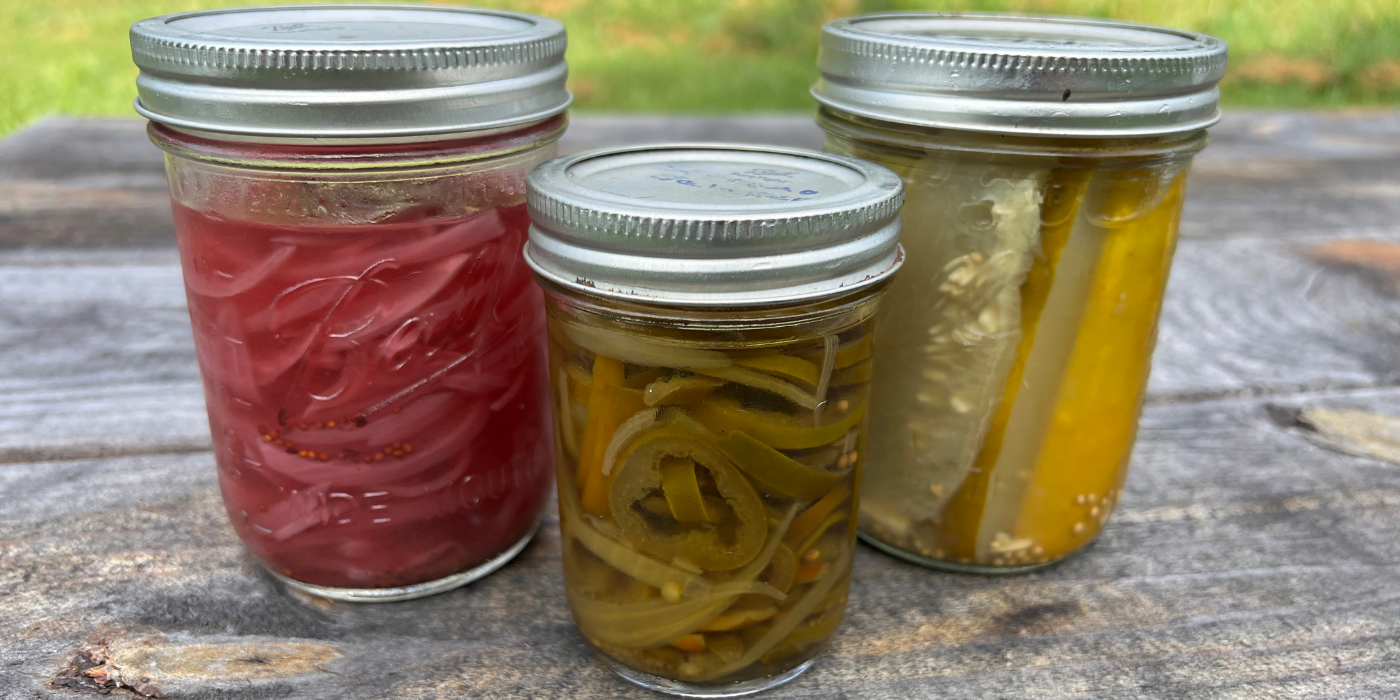As the start of the school year approaches and it begins to feel more and more like late summer, preserving the flavors of peak summer is prime for the picking — or the pickling! There are many ways to preserve the bounty of produce from Buncombe County farmers tailgate markets including pickling, fermenting, freezing, canning, dehydrating, and more. Without wishing the summer season away, think ahead to what you might want to be eating through the winter that won’t be available after the first frost in mid-October until their long awaited return next summer.
If you are new to food preservation, pick up a book from your local library or bookstore or search for workshops in the area. Some methods are flexible and go with the flow while others have specific needs or instructions or promote food safety.
Savoring the season and preserving the harvest is a longstanding cultural tradition across the world with early beginnings in lacto-fermentation. Fermentation involves submerging fruits and vegetables in a salt (and sometimes added water) brine, keeping the produce below the surface of the brine with a weight to create an environment where the good bacteria (lactobacillis) grows and the bad bacteria stays at bay. Add a burping lid or a setup that allows the carbon dioxide to release without oxygen getting in. Place it in a cool dark place to ferment for four days to two weeks, depending on the room temperature and how tangy you like it — be sure to check on it regularly. Once fermented, remove the burping setup and weight, seal it with lid and keep it in the fridge for a couple months to a year. You can ferment almost any vegetable though crunchier vegetables lend themselves well – think cucumbers, cabbage, carrots, cauliflower, peppers, and beets. Lacto-fermented and blended hot peppers make a delicious hot sauce.
With modern conveniences, water bath or pressure canning is another popular way to stock your shelves through the winter. Canning helps reduce waste and save money by reusing glass jars or buying bulk seconds from farmers. Farms like Gaining Ground (at River Arts District and North Asheville markets) often sell seconds or canning tomatoes in big boxes for this very purpose. Making shelf-stable canned produce is ideal for high acid foods like tomatoes, fruits, jams, and pickled (with vinegar) vegetables. Just imagine a cold mid-winter day with warm heirloom tomato sauce made from peak summer harvests. Find a recipe that sparks your taste buds and follow the food safety instructions.
Quick pickling is similar to canning pickled produce but without the canning process. While not shelf-stable, quick pickles can last in the fridge for weeks to months. Pack veggies of choice into your jar or glass container — think pickled red onions or bread and butter pickles. Make a boiling hot brine of one cup water to one cup vinegar, 1 tbsp of salt, add some honey if desired and pour over the packed veggies.
Dehydrating and freezing can both be quite manageable. You can purchase a dehydrator for a fairly affordable price these days or you dehydrate using a home oven on a low temperature over many hours. Herbs can be easily bundled and hung upside down in your kitchen. Freezing usually requires blanching the produce first, making it a multi-step process. And if you want pieces to not freeze together, lay them flat on a tray to freeze first before transferring to freezer bags.
If you end up not doing any food preservation yourself, many vendors at Buncombe County farmers markets have you covered nearly year round. Find preserves from Root Bottom Farm at West Asheville and occasionally North Asheville markets, Imladris at North Asheville Tailgate Market, Stump Farms at Asheville City Market, Windy Hollow Farms at Weaverville Tailgate Market, McConnell Farms at North Asheville Tailgate Market, and Creasman Farms at West Asheville, City, North Asheville, and Black Mountain markets. Find lacto-ferments from Serotonin at West Asheville, River Arts District, North Asheville, and Black Mountain markets, Queeny Kimchi at Weaverville Tailgate Market, and Fermenti at East Asheville Tailgate Market.
Also spotted at markets in recent weeks: tomatoes, sweet and hot peppers, cucumbers, summer squash, okra, beets, lettuce, cabbage, broccoli, cauliflower, carrots, kohlrabi, green beans, kale, swiss chard, mushrooms, eggplant, okra, potatoes, onions, scallions, peaches, plums, nectarines, blueberries, melons, sweet corn, and fresh herbs. Markets offer an abundance of farm-fresh eggs and meats, including chicken, pork, beef, and lamb. You can also get bread, cheese, pastries, fermented products, drinks, and prepared foods. Find more details about farms and markets throughout the region, including hours and location, in ASAP’s online Local Food Guide.

